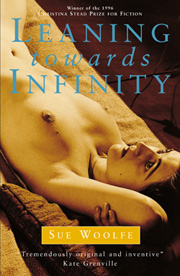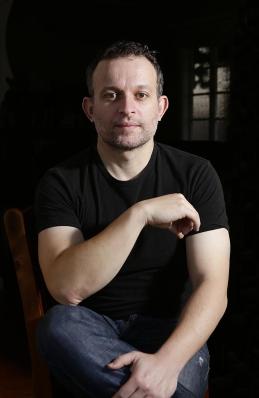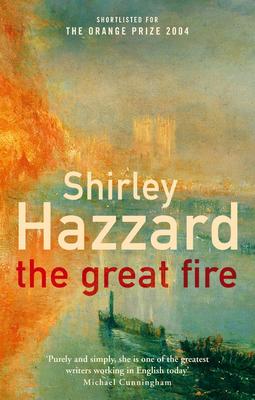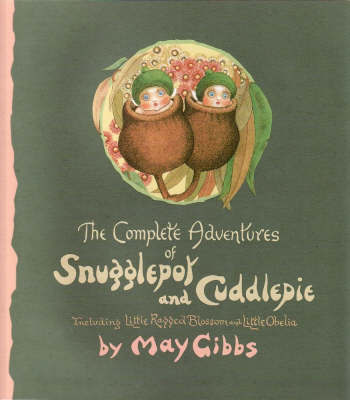- Our Souls at Night, Kent Haruf
- Behold the Dreamers, Imbolo Mbue
- The Girls, Emma Cline
- Good Morning, Midnight, Lily Brooks-Dalton
- The Dry, Jane Harper
- All the Light We Cannot See, Anthony Doerr
- Truly, Madly, Guilty, Liane Moriarty
- Nutshell, Ian McEwan
- Barkskins, Annie Proulx
- The Rules of Backyard Cricket, Jock Serong
Category: fiction
August Best Sellers: Fiction!
- The Girls, Emma Cline
- The Last Painting of Sara de Vos, Dominic Smith
- Truly, Madly, Guilty, Liane Moriarty
- The Toymaker, Liam Pieper
- My Name Is Lucy Barton, Elizabeth Strout
- Blue Dog, Louis de Bernieres
- Hope Farm, Peggy Frew
- The Muse, Jessie Burton
- The North Water, Ian McGuire
- Between a Wolf and a Dog, Georgia Blain
Staff-Shelf Talker: The Girls, Emma Cline
 It’s appropriate that the cover of Emma Cline’s startling The Girls features a blurb from Lena Dunham, creator of the similarly named HBO comedy. Like Dunham, Cline’s fictional world is one fixated on the nuance of emerging womanhood, where experience is not just perceived but mapped through the workings of the body. The process is messy, it is frequently cruel, and requires careful artistry on the part of the author, a surgical knack for differentiating what her readers know and what her characters are allowed to perceive. Though she makes no claim as brazen as Dunham’s infamous “voice of a generation” line, Cline succeeds, through precision and insight, in achieving much the same thing. This is not a novel about girlhood, though its femininity is essential. It is a novel about being alive.
It’s appropriate that the cover of Emma Cline’s startling The Girls features a blurb from Lena Dunham, creator of the similarly named HBO comedy. Like Dunham, Cline’s fictional world is one fixated on the nuance of emerging womanhood, where experience is not just perceived but mapped through the workings of the body. The process is messy, it is frequently cruel, and requires careful artistry on the part of the author, a surgical knack for differentiating what her readers know and what her characters are allowed to perceive. Though she makes no claim as brazen as Dunham’s infamous “voice of a generation” line, Cline succeeds, through precision and insight, in achieving much the same thing. This is not a novel about girlhood, though its femininity is essential. It is a novel about being alive.
When we are introduced to the protagonist, Evie, a fourteen-year-old Californian beset with domestic turbulence, she is as much a blank canvas as Twilight’s soulless Bella Swan. The difference is perspective: Cline understands what lesser writers of both sexes fail to appreciate. People, at Evie’s age, are essentially nondescript, devoid of experience but newly acquainted with consciousness, the desire to be formed into something more than what they are. Much of the hype surrounding The Girls focuses on the context in which Evie experiences this actualisation. Evie, on the cusp of adulthood in the late sixties, is indoctrinated into a Manson Family inspired cult.
One of the many remarkable things about The Girls is the way in which Cline directs Evie down this path, navigating the pitfalls of cliché and melodrama so that the cult—which one imagines featured prominently in the elevator pitch that won Cline an advance to the tune of two million dollars—is, in a sense, almost incidental. More importantly, its leader, the obliquely drawn Russell, is depicted not so much as the sun around which the titular girls orbit, but as a bad musician, a delusional egotist. Cline, so sparing in her characterisation of the supposed catalyst for the novel’s action, must find another reason for Evie to become submerged in this sepia-drenched world of new age fanaticism. Her reason gives the novel not only its title, but its window into the human psyche.
Though Evie’s view of the ranch on which Russell’s acolytes make their home is willfully airbrushed, she scrutinises its inhabitants more closely. In the world of the ranch there is a secret world of girls, who share beds and clothes, the man they are all drawn to. It is this world that Cline etches with candid detail; “ankles gruff with stubble, or the pin dots of blackheads.” The relationships between the girls are rich and unknowable, their dynamic far more sophisticated than Evie herself is aware.
Chief amongst the girls is the charismatic Suzanne, a hard, unforgiving creature described in an early encounter as resembling John Huston’s daughter. Suzanne is Russell’s lieutenant; she is Evie’s protector and idol. Evie covets her dangerous, unapologetic femininity, comparing her to Connie, the classmate she was once friends with: “how she and I had watched television until we got blinky headaches and popped pimples on each other’s backs in the harsh light of the sun.” Suzanne’s world is more fluid, steeped in the ambiguities of sex and violence, a conflation of pleasure and pain that Cline compares to the abrupt pulling of a ponytail. It is her inability to comprehend this world that feeds Evie’s desperation to inhabit it.
Cline’s aesthetic is a Romantic one: the beauty of her California is underscored, even enhanced by its decay. Aside from the literal dereliction of the ranch, with its burnt-out cars and appalling standards of hygiene, there is a taint of evil that infects the place, and Cline takes no pains to conceal its eventual outcome. True to their real life counterparts, Russell’s followers commit a murder: an act of mindless, orgiastic violence that Evie herself is not privy to.
The tale of girlhood is punctuated occasionally by the present day, in which Evie is a middle-aged woman, still pursued by the phantoms of her adolescence. In these passages Cline, so masterful in her characterisation of the young Evie, stretches her talents even further, seamlessly re-sculpting her voice to feel heavier with experience. Though the older Evie’s scenes as a sort of hermit living in the borrowed house of a formerly close friend are less compulsively readable than her time on the ranch, they provide a necessary and effective counterweight to the high-gloss sugar rush of youth: a sense that, even despite all she has experienced, there is still so much for her to fear.
That Cline succeeds in sustaining tension throughout the book despite the reader’s full knowledge of the grizzly outcome is a testament to her subtle and inventive approach to her subject. There is exactly one open display of violence, in which an irate Russell slaps one of his disciples, though many more scenes carry the implication of it, lurking just beyond the sun-drenched periphery. Evie is, undeniably, a fanatic, but not of the sort one might expect her to be. She worships not Russell, or even Suzanne, but the intoxicating promise of a shared girlhood: desperate to believe that, in a state of flux, when merely existing is an act of survival, there is a possibility she is not alone. It is the thesis of all great literature, the syntax of the language of girls.
-Myles
Riverbend Fiction Recommendations: June
- The Last Painting of Sara De Vos, Dominic Smith
- My Name is Lucy Barton, Elizabeth Strout
- The Bricks that Built the Houses, Kate Tempest
- Everyone Brave is Forgiven, Chris Cleave
- Between a Wolf and a Dog, Georgia Blaine
- The Nest, Cynthia d’Aprix Sweeney
- The Group, Mary McCarthy
- Our Tiny Useless Hearts, Toni Jordan
- The Dry, Jane Harper
- Your Heart is a Muscle the Size of a Fist, Sunil Yapa
Best Sellers: Fiction
- My Brilliant Friend, Elena Ferrante
- At the Edge of the Orchard, Tracy Chevalier
- Salt Creek, Lucy Treloar
- Hope Farm, Peggy Frew
- The Life of Elves, Muriel Barberry
- A Little Life, Hanya Yanagihara
- The Promise Seed, Cass Moriarty
- A Few Days in the Country and Other Stories, Elizabeth Harrower
- The High Places, Fiona McFarlane
- Brother of the More Famous Jack, Barbara Trapido
Patrick Holland’s Shelf Talkers
This month’s author recommendations is from local writer Patrick Holland, who’ll be joining us in-store on April 19th to discuss his upcoming novel One. Click on the image to book tickets to the event!
I read a lot of books at once, bits and pieces of them. Among the most interesting things I’ve read lately are The Collected Stories of Paul Bowles. The stories evoke an atmosphere of North Africa/Tangiers that you feel sure is authentic, even though you’ve never been – and never can go to Tangiers circa 1950. The best stories are a strange as Kipling, but, and this accusation was sometimes levelled at Kipling, the author seems to have no normal human sentiments at all. It’s said the Russian realists devoted themselves to objectivity, but we all know what kind of men Tolstoy and Dostoyevsky were i.e. good men. I have no idea how Bowles feels on any moral issue, at times he’s properly frightening in his coldness, and yet, the stories are incredibly compelling, and the strange distance he puts you at, no doubt contributes to this.
On the other hand, also on Africa (I’m planning to go soon), I’ve been reading Ryszard Kapuściński’s book of travel essays, In the Shadow of the Sun. It’s easily the best travel book I’ve ever read, and I wish I’d read it before I wrote Riding the Trains in Japan. I realise now, the aesthetic principles that govern Kapuściński’s book are the ones I was trying to follow. I love Hemingway and Okri on Africa, but Kapuściński makes you breathe the air and taste the water.
The other book I’ve been picking up when I can is Edward Seidensticker’s translation of Lady Murasaki’s The Tale of Genji. I’ve spent plenty of time in the places this – perhaps the first novel ever written – takes place in. But apart from that simple joy of reading about places you know, I enjoy Murasaki’s weaving of plotlines, concerning dozens of characters, and the minimalist poetry she retains throughout. The effect is completely immersive. Like cycling up a mounting, reading Genji you forgot your troubles for a bit.
Ah, and I’m also reading Robert Dessaix’s Night Letters. I’ve come really late to Dessaix – this is the first of his I’ve ever read, and though I’m only about thirty pages in, it’s already an enthralling meditation. It’s the sort of book that blows any preconceived ideas you have about the thematic and stylistic parameters of Australian Literature out the window.
Top 10: Fiction
- The High Places, Fiona McFarlane
- My Brilliant Friend, Elena Ferrante
- All the Light We Cannot See, Anthony Doerr
- The Buried Giant, Kazuo Ishiguro
- The Promise Seed, Cass Moriarty
- Thirteen Ways of Looking, Colum McCann
- The Midnight Watch, David Dyer
- The Noise of Time, Julian Barnes
- Fates and Furies, Lauren Groff
- Salt Creek, Lucy Treloar
Top 10: Fiction
- The High Places, Fiona McFarlane
- At the Edge of the Orchard, Tracy Chevalier
- Brooklyn, Colm Toibin
- The Whites, Richard Price
- Did You Ever Have a Family, Bill Clegg
- A Little Life, Hanya Yanagihara
- Angle of Repose, Wallace Stegner
- My Name is Lucy Barton, Elizabeth Strout
- The Japanese Lover, Isabel Allende
- The Natural Way of Things, Charlotte Wood
Our Stella Sparks!
Two more Stella Sparks from our wonderful staff members, both of whom are sharing novels that fueled their love of reading at university.
Leaning Towards Infinity, Sue Woolfe

I was assigned Sue Woolfe’s Leaning Towards Infinity as a university student, and remember being less than enthused at the prospect of reading a book about mathematicians. Numbers have never been my friends. It was, then, a wonderful surprise to discover Wolfe’s ability to weave the language of mathematics into a thing beauty and mystery. I may never be able to solve an equation, but Sue Woolfe altered my view of mathematics from one of abject dread to one of awe. The fact that the book – which won a slew of awards when it was first released twenty years ago – is so difficult to come across now speaks volumes for the importance of programs like the Stella Sparks.
-Vicky
The Great Fire, Shirley Hazzard
Shirley Hazzard’s The Great Fire was introduced to me via an Australian Literature course at University. At first, I lamented – another book about the Second World War. The power of Hazzard’s prose, however, gripped me from the very start. It wasn’t the plot that hooked me, but the depth and creation of the characters. They move through a world rife with violence and despair, and yet find their humanity within each other, indulging in a love within which age has no bearing. Although the relationship between the thirty-two-year-old Aldred Leith and the teenage Helen Driscoll is a primary focus, The Great Fire is also a novel about civility, humanity, the world that we create for ourselves and the prisons within it that have no bars.
-Chloe
Our Stella Sparks!
Over the next few weeks our staff members will be posting their Stella Sparks, a fantastic initiative of the Stella Prize where readers recommend their favourite book by a female Australian author (our store owner Suzy Wilson is on the judging panel for this year’s award.) Here are a few of the very wonderful books that have been formative in our reading experience.
Snugglepot and Cuddlepie, May Gibbs
As a small child growing up in North Wales my first contact with anything Australian was Snugglepot and Cuddlepie. While I found the book delightful it was not until I came here to live twenty years later that the images resonated and I realised I had a lot of Australian reading to catch up on. Selecting one “Sparkling” title out of over forty years of reading is surely an impossible task with such Stellar authors as Kate Grenville, Ruth Park, Joan London, Helen Garner, Mem Fox, Sonya Hartnett, Geraldine Brooks, Chloe Hooper and Madeleine St John to name a mere handful…and of course not forgetting Germaine…and Anne Summers. So many wonderful authors over so many genres, heavens I cannot even choose a favourite genre! Too many books, not enough time. My favourite book is usually the one I am currently reading and at the moment that is R A Spratt’s Friday Barnes – Oh it is such fun!
-Maz
The Man Who Loved Children, Christina Stead
When I was eighteen I came across a discounted copy of The Man Who Loved Children by Christina Stead. I was intrigued by the foreword, a rapturous and lengthy essay by Jonathan Franzen, and that despite the eagerness of Australians to claim any remotely successful creative export as ‘Ours,’ I’d never heard of Stead. The monstrous novel is a confronting, uneasy read, with the outsized characters at its centre dancing a fine line between tragic and farcical. But it’s Stead’s ability to extract pathos from these loathsome individuals that prove her to be a writer in the league of Austen and Dickens: a powerfully imaginative masterclass in making the personal political.
-Myles
The Forests of Silence, Emily Rodda
I read Emily Rodda’s The Forests of Silence from the Deltora Quest series for the first time when I was ten years old. I was required to read it for an English assignment at the time, and while I was initially reluctant – I’ve never been a fan of fantasy – I was instantly enthralled in the elaborate and spectacular world that Rodda had created. Nine years later, while tutoring a boy who was also tasked with writing an assignment on the novel, I discovered the universal love for the world of Deltora. Lief’s heroic race against the Shadow Lord to retrieve the gems from the belt of Deltora is enough to spark the imagination of any young child. While there are countless incredible books that have shaped my literary palate, the Deltora Quest books are the first I can recall that truly sparked my sense of wonder and my passion for reading.
-Alex





